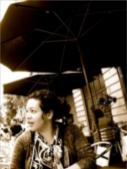
Raquel Albarrán
Acting Assistant
Professor, Spanish
When Raquel Albarrán learned that the Division of Spanish and Portuguese Studies had hired her, she invested in a new pair of rain boots. It was summer in Philadelphia, it was hot, and there was not a drop of rain in sight. But she wore those rain boots constantly.
Acting Assistant Professor Albarrán, one of the newest members of the division, specializes in colonial Latin American studies, race, and material culture, with a secondary focus on Hispanic Caribbean literature and culture. She is interested in the ways people use objects to mediate different worlds. “Objects are repositories of experience,” explained Albarrán, “and a way to attach positive meaning to an experience.” The boots were her way to put this insight into practice before she set foot in Seattle.
Raquel Albarrán’s welcome to Seattle was, quite literally, through another object: a door. Suzanne Petersen, Acting Chair during the fall quarter of 2012, helped Albarrán cut and sand an old door, transforming it to the desk on which Albarrán now writes. “In medieval times the table became a metaphor of knowledge,” said Albarrán. “The time and effort Suzy and I spent on the desk infused a special meaning into it and has made the process of finishing my dissertation more personal,” she added. “It was the best way to come into the department.”
Albarrán’s first undergraduate class this past fall was Introduction to Latin American Literature: Colonial Era through Early Independence. During winter quarter she is teaching a graduate course on Latin American material culture and colonialism.
After majoring in in Biochemistry and Nutrition at the University of Puerto Rico, a fellowship to study the breast-feeding patterns of Andean women in Peru in 2004 provided an awakening for Albarrán. “Our study was overlooking the power relations involved in data collection, and the larger cultural context of the research,” explained Albarrán. “I was interested in the relation between material processes (typically the realm of the hard sciences) and culture, but I was not feeling like I could pursue this research from the narrow disciplinary tools that I had at the time.”
Returning from Peru, Albarrán immediately began another fellowship at Tufts, working with aging Puerto Ricans in Boston. “Similar shortcomings,” she explained, “turned my focus to disenfranchised populations and the larger histories that unite them. Born and raised in Puerto Rico, I saw how colonial structures of inequality were a common denominator throughout these early research experiences as an undergraduate.”
“I took this job at UW because it not only fulfills my commitment to public education, but also because it allows me to work with a diverse student body,” said Albarrán. “Understanding the issues that impact minority populations and contributing to the way we imagine our communities inside and outside the university all motivate my pedagogical and research approaches,” she explained. Her goal is not to align students with her views, but to enable them to be agents for their own awakening. “I seldom tell students what I think, but I structure my syllabus so that they will ask questions about what they think.”
“UW is a good fit for me, this department in particular,” said Albarrán, who is excited about the new Spanish PhD program, which includes a Certificate in Public Scholarship. “Anthony Geist (Chair) and the rest of my colleagues have a strong vision about the humanities in the 21st century, and particularly about reinserting critical thought into daily life,” she said. “I am grateful to them for seeing the possibilities and challenges that necessitate multiple forms of knowledge and collaboration across disciplines.”
Besides being a scholar, Albarrán is an accomplished poet and performance artist. Her poetry book, Intimidad de los extraños (Stranger Intimacy), which was published by Atarraya Cartonera in 2010, explores the possibilities of meaningful intimacy between strangers as well as the pockets of estrangement that manifest between people who are close to each other. She has developed and performed several performance pieces, one of which involved hand copying a censored book at the Museum of Contemporary Art in Puerto Rico.